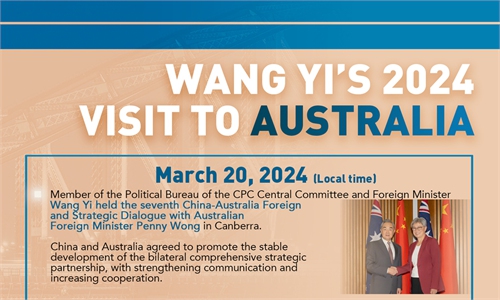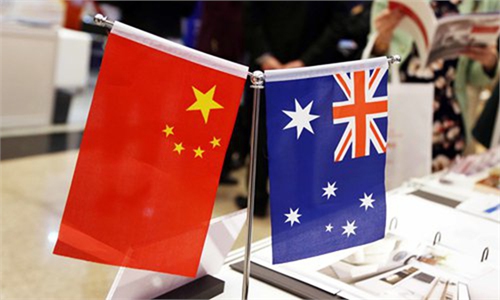China, Australia should cherish good partnership, resolve differences through dialogue

Illustration: Chen Xia/ GT
China and Australia should be good economic partners rather than political rivals, as the two countries enjoy all-round and multi-field relations, and their common interests far outweigh their differences. For the sake of peace, stability and prosperity in the vast Asia-Pacific region, the two countries ought to get on good terms.
The experiences of the past many years show that whenever China and Australia agree to join hands toward forging a constructive partnership, the disputes and differences would always be properly resolved, benefiting the two peoples.
During Chinese Foreign Minister Wang Yi's latest visit to Canberra, he told Australian government officials that the two countries' relations have embarked on the trajectory of improvement, and the two nations should take a more active attitude to jointly build a more mature, stable and fruitful comprehensive strategic partnership.
Wang, who is also a member of the Political Bureau of the CPC Central Committee, said that "Australian friends could come to China to have a better understanding of China and share more true stories about China-Australia exchanges" in order to promote friendly interactions between the two peoples while expand mutually beneficial economic cooperation.
China has always advocated and practiced multilateralism, advocated the democratization of international relations, opposed unilateralism and bullying, and actively pushed for an international order to develop toward a more just and reasonable direction, Wang said.
Australian officials said the two countries have more common interests than differences, while expressing firm support for broader engagement and dialogue and partnership in the field of trade, finance, education, public health, scientific research, green development, and law enforcement.
By all metrics, the relationship has come back to normalcy now. Earlier, Canberra decided to suspend the anti-dumping measures against Chinese wind towers, which will help resolve other trade disputes between the two sides, including the anti-dumping and anti-subsidy tariffs imposed by China on Australian wine products in 2021.
Earlier, China's Commerce Ministry said the case is undergoing a review. The ministry stated that it "will adjudicate objectively, fairly and openly, based on the claims of each interested party and after examining the evidence." Breaking the impasse on wine imports from Australia will provide a significant relief for Australian winemakers and grape farmers there. The expected move, following the ministry's earlier dropping of anti-dumping duty on Australian barley and resumption of Australian timber and coal imports will greatly shore up the improvement of their bilateral relations.
Co-presiding the seventh China-Australian Foreign and Strategic Dialogue with Australian Foreign Minister Penny Wong, Wang said the ups and downs in China-Australia relations over the past 10 years have left behind lessons to be learned and cherished, which include upholding mutual respect, seeking common ground while shelving differences, and adhering to mutual benefit, self-independence and autonomy.
"Since China-Australia relations are on the right track, both sides should have no hesitation, no yawing and no backward steps," Wang remarked.
By all metrics, the two countries should not allow differences to define the relationship. Actually, there are no grudges in history or conflicts of interest between China and Australia, and their common interests far outweigh their differences.
From a deep frost in the past years to regaining room temperature in this relationship, both countries realize that political bickering and confrontation are in neither side's interest. As two important big economies in Asia-Pacific region, China and Australia are obliged to be on good terms, build up their strategic partnership, and share the responsibility to shore up regional peace, stability and economic prosperity that will benefit all people in this region.
Australian Prime Minister Anthony Albanese told Wang that the ruling Australian Labor Party made a historic contribution to the establishment of diplomatic relations between the two countries. His Labor Party government will continue efforts to advance the constructive development of Australia-China relations.
As major partner members of the RCEP - the world's largest free trade zone, China and Australia have long enjoyed closely intertwined trade and economic relations, because their economies are highly complementary and mutually reinforcing too.
During the past few years, the two countries were hobbled by intense difficulty in relations when Australian government was led by Liberal Party leaders, in particular Scott Morrison, who leaned toward to toeing the lines of the US in relentlessly smearing and demonizing China.
Australia had traditionally kept mostly pragmatic and largely amicable ties with its neighbors, including China. However, the Morrison government went out of its way to pick fights with China on a flurry of issues, including Hong Kong, Xinjiang, Taiwan, South China Sea and even accusing Chinese meddling in Australian domestic politics, sending bilateral relations to a deep freeze.
Morrison's China policies were miserably misguided. Political analysts in Australia overseeing the machines of the two major parties, the Liberal and the Labor, acknowledge the fact that the Morrison government's often harsh rhetoric on China and its penchant for picking a fight with Beijing contributed to his election defeat in 2022, as the majority of the public in Australia are supportive of maintaining a healthy relationship with China.
Since Labor Party came into power, Australia's relations with China have noticeably improved under Prime Minister Albanese's wise management. "I think there are promising signs," said Albanese in late 2023. "We have already seen a number of the impediments to trade between our two nations removed, and a substantial uplift in the trade between our two nations is seen."
In the future, the two countries should always place the interests of their peoples at the center and front, enhance good-willed dialogue and solve their differences through consultations, and enhance cooperation between the departments of foreign affairs, commerce, science and technology, and environmental protection.
The author is an editor with the Global Times. bizopinion@globaltimes.com.cn



